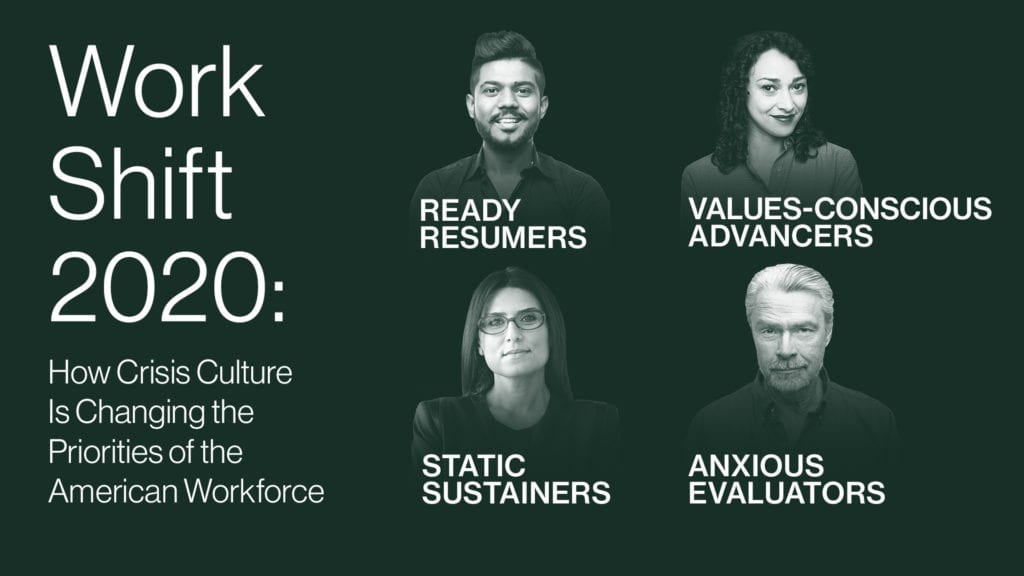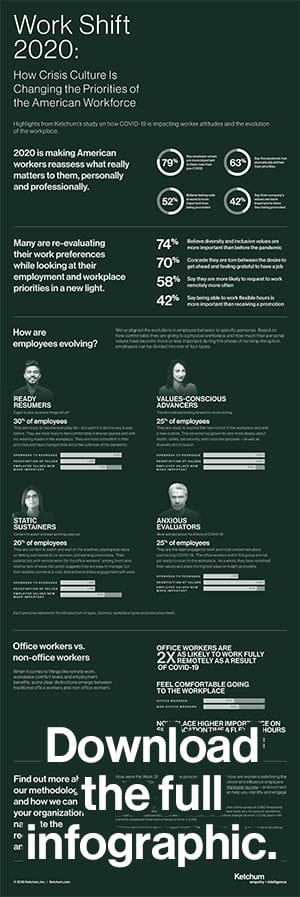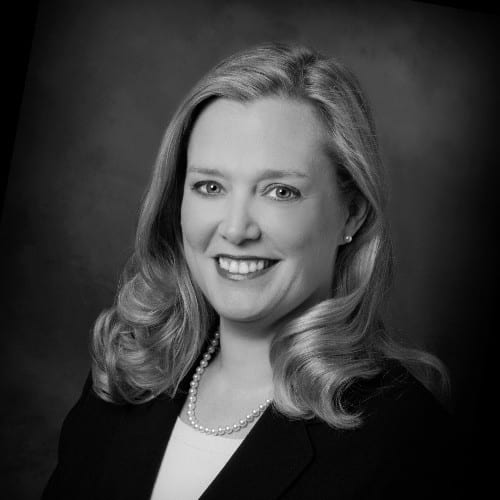Across every industry, employees’ lives have been upended by the COVID-19 crisis, radically changing the expectations and values of the workforce. Almost two-thirds of American workers (63%) say the pandemic has prompted them to dramatically reevaluate their professional priorities, according to a new Ketchum study, Work Shift 2020: How Crisis Culture is Changing the Priorities of the American Workforce. For employers, the already high stakes of employee engagement just got higher—and the challenges more complex.

For starters, traditional engagement topics such as career development are taking a back seat to new topics. More than half of workers (52%) now say that feeling safe at work is more important than being promoted, according to Ketchum research. At the same time, 79% say that employer values are more important to them now than before the pandemic.
The big shifts taking place have signaled to many organizations the need to hit the reset button on employee communications. Strategies and tactics that worked just four months ago might not work as effectively today as employees undergo an existential transformation and settle in for the long haul with the pandemic. Since February, many employers have increased the cadence of regular communications to their team members and shifted the tone to be more human and connected. This shift is one that we believe will remain important moving forward.
What does hitting the reset button look like? Based on work Ketchum is doing with clients across a range of industries, here are a few insights that can help you navigate the new realities of employee engagement.
Don’t rely on legacy employee personas. There are new ones in play.
Ketchum identified four distinct personas making up today’s workforce, based on their reported change in values and their openness to reengage. These personas are:
- Ready Resumers—prepared to pick up where things left off; have not shifted their values as a result of COVID-19 (representing 30% of employees)
- Values-Conscious Advancers—transformed and looking forward to reconnecting (25%)
- Static Sustainers—content to watch and wait as the COVID-19 crisis plays out (20%)
- Anxious Evaluators—least engaged at work today and most worried about the effects of COVID-19 (25%)
Tailoring messages to each persona—i.e., individualizing the way you communicate—is now imperative. As more workers expect companies to focus on human values (safety, health, diversity and inclusion), they also expect to be recognized as unique individuals.
Accelerate and sustain.
The shift in employee mindsets has happened quickly. For one, COVID-19 has accelerated the once seemingly far-off workplace of the future. Our study showed that nearly half the participants said they value flexibility over career advancement. Additionally, diversity and inclusion has become a top-of-mind topic—with 74% of workers saying diversity and inclusion values are more important now than they were before the pandemic. Ad hoc tactics will no longer suffice. Companies will have to up their game. To thrive—and help their employees thrive—employers will require adaptable, future-facing, rapidly deployable engagement programs.
Show workers how they matter.
The employee is your No. 1 stakeholder: the essential engine that runs your business—your top influencer, internally and externally. When you connect in meaningful ways and show workers they matter, you strengthen your most valuable asset. Industry leaders get it. We’ve all seen major retailers and healthcare organizations praising their frontline workers on a national stage while also recognizing and rewarding employees individually. Meanwhile, companies in industries such as energy, manufacturing, and food production are reinforcing the connection between the work that employees do and the societal value it brings—with messages about powering, supplying, and feeding the country.
Measure so you can manage.
 There’s a classic saying that you can’t manage what you don’t measure. With the right measurement tools and practices in place, you can determine the best cadence, tone, and mechanisms for reaching the various employee personas. And you can customize strategies for specific topics, including traditional topics such as career development. Two-way communication—listening to the voice of the employee—will be essential for getting timely, relevant insights.
There’s a classic saying that you can’t manage what you don’t measure. With the right measurement tools and practices in place, you can determine the best cadence, tone, and mechanisms for reaching the various employee personas. And you can customize strategies for specific topics, including traditional topics such as career development. Two-way communication—listening to the voice of the employee—will be essential for getting timely, relevant insights.
Think outside the cubicle.
There’s an additional dimension to consider: whether someone is a traditional office worker or a non-office worker. Some officer workers are now working remotely for the first time. Meanwhile, traditional non-office workers may be viewing their jobs through a new lens. Watch for the distinctions (and there are plenty). For example, our study found that 89% of office workers now place higher importance on sick/vacation time, compared to 76% of non-office workers. Additionally, office workers are more than twice as likely to be working fully remotely compared to non-office workers.
Create a plan—and a new playbook.
At Ketchum, we work daily with industry leaders to assess the new workforce environment, create flexible strategies, develop engagement programs, and deploy tailored content for connecting meaningfully with employees—from old-school workplace posters to sophisticated digital campaigns. Companies having the most success are those that approach challenges in a unified way—planning and tightly connecting all the pieces, from assessment through to deployment.
Tools such as our employee persona diagnostic tool become essential. But there are many jobs to be done across assessment, strategy, development and deployment—requiring multiple types of tools and diverse capabilities that we bring to help clients take engagement to the next level.
Wondering if you have the right tools for the COVID-19 crisis and the redefined workplace? Want to find out more about our approach—and get more insights from Ketchum’s Work Shift 2020 study? Interested in learning more about the consumer personas we uncovered in our Brand Reckoning 2020 study? Just let us know.




